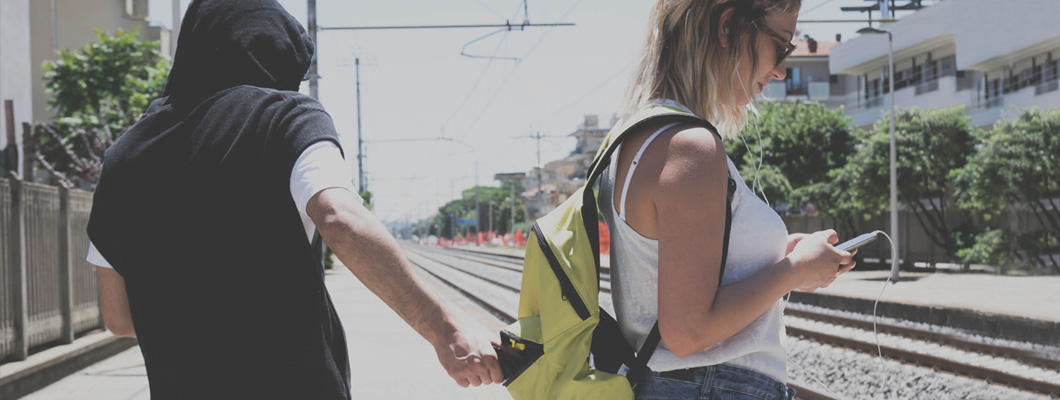
Some people’s attitude about being robbed is a great example of optimism bias. The “it won’t happen to me” mindset is more or less universal, and it's something that can become more prevalent when people travel abroad. The fact is, every year more than 980 Australians are robbed while on an international trip, according to the Department of Foreign Affairs and Trade (DFAT). That’s almost 20 a week. And it’s not just the frequency of theft that’s surprising, the unexpected locations are also a cause for concern.
DFAT lists some of the most popular holiday hotspots as the places you’re most likely to be robbed. The top five are France, Spain, Germany, Italy and Mexico.
But don’t worry; if you do meet with trouble abroad, you can get your trip back on track much more quickly if you’ve done your research and know the steps to take to reduce stress and financial loss.

There are many possibilities 1Cover Travel Insurance covers you for, but just like most insurance policies, there are some things you likely won't be covered for. Here are a few of the main ones.
If you’re being mugged or held-up always hand over what you have on you. This will prevent your attackers becoming more agitated, and ensures the ordeal is over as soon as possible.
Get yourself to the nearest emergency department, or if you are too badly injured to move call an ambulance. If you don’t know the emergency number for the country you’re in, call your travel insurers emergency assistance number, or 24-hour consular assistance on 1300 555 135 or +61 2 6261 3305.
Most banks have a 24-hour emergency service you can call. You can also do this this online or via a smartphone app with some banks.
Dealing with police in a country where you don’t speak the language can be challenging, but the Australian embassy can provide a translator and provide general assistance. Most of the time the police won’t be able to get your belongings back, but you will need the police report to claim this loss on your travel insurance.
You’ll need to report it stolen and get yourself a new one. Go to the nearest Australian embassy, high commission or consulate, and they’ll help you apply for a new one. If the embassy is closed, jump online or call the 24-hour consular assistance number.
If you’re going to make a claim for medical assistance, or are going to make a claim on your stolen luggage or personal items, they’ll be able to tell you what steps you need to take.
Even if you don’t have access to your supporting documentation, they’ll at least be able to give you advice on what you can claim for, and help you get your claim started.
If your keys have been stolen and ask them for a new set or to re-set your swipe card. This will give you peace of mind that you, and any possessions in your room are safe.
Try calling it or using a find my phone app to track its location. If you know for a fact it’s been stolen, don’t endanger yourself by tracking it down. Contact your carrier to put a block on your number so no charges can be placed on it and report it stolen to the police. Be sure to get a police report, so you can make a claim with your travel insurer.
Ask a friend or family member to send you some via Western Union. To access this cash you’ll need the tracking number provided to the sender, and some identification. The Australian embassy can also issue small loans in case of emergencies.

Travelling is fun, exciting, and full of adventure. But that doesn't mean there aren't hiccups along the way. Here we tell you what to do if you're ever robbed while travelling overseas, and also offer you some handy tips to help you avoid it altogether!
Be smart about your bags. Backpacks are much harder to snatch than shoulder bags. Get a colourful suitcase; you might think it looks gaudy, but thieves will be less likely to take something that’s easily spotted and identifiable.
Lock up your valuables. Bring baggage locks for your luggage, and use them always, even when you're in accommodation that may not be 100% secure, such as guesthouses and hostels.
Don't carry all your cash in one place. Store your cash in a few different places in your bag or your body, and keep a spare debit/credit card locked in your room.
Use the room safe. Be sure to change default combinations such as 0000 or 1234, and make sure the safe is bolted to the wall or cupboard before use.
Be aware of your surroundings. Wandering and exploring is all part of the fun when travelling, but if you do have a destination in mind know how to get there before setting off. If you’re standing out in the open holding a map, looking around, you’re making yourself a target.
Use safe ATMs. Always use ATMs inside bank lobbies and hotels where possible, they are much less likely to have skimmers installed on them.
Be WiFi aware. Cyber crime is becoming more widespread, so only log into WEP, WPA and WPA2 networks when accessing public WiFi. Even then, only use sites with a https connection, which is indicated by the little padlock in your browser. Never access sensitive information from a public computer unless you are sure it's secure.
Back up your camera. Try and do this every night either to the cloud or a laptop. If your camera gets stolen at least you won't have lost all of your trip photos.

Your chances of being robbed are always higher in some situations than others. Always take care if you’re doing the following:
Being robbed by cab drivers is rare, but it does happen. When choosing a taxi only get in a marked car, make sure they turned the meter on and have their ID clearly displayed.

Visit our Activities Page to see what sorts of activities you're covered for and what you're not.
A pre-existing medical condition is something that must be disclosed when you’re purchasing travel insurance. Find out what they are and how they affect your travel insurance.
You or someone you’re travelling with is going to have a baby…so you’ll need to find out how travel insurance works for pregnant women
From lost luggage, to cancellation, to repatriation. Travel with peace of mind and find out what else you're covered for and what you're not.